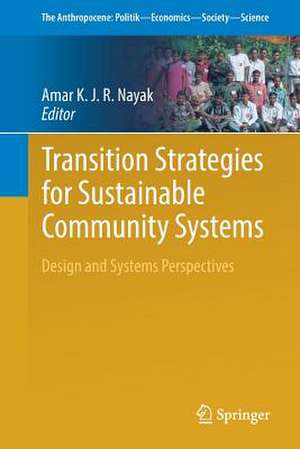Transition Strategies for Sustainable Community Systems: Design and Systems Perspectives: The Anthropocene: Politik—Economics—Society—Science, cartea 26
Editat de Amar KJR Nayaken Limba Engleză Paperback – 4 feb 2019
This book presents five critical dimensions on relationships, institutions, produc-
tion, organisation, and governance from design and systems perspectives for the
systematic transition of unstable and vulnerable communities across the world to
sustainable community systems.
• The first section discusses features of relationships and processes to deepen
cooperation and trust within a community.
• The second section examines institutions within and outside a district to
foster synergy across institutions within a district and to minimise negative
externalities on local communities within a district.
• The third section deals with food production systems that are nature-
friendly, resilient, efficient and sustainable.
• The fourth section discusses the design of producer organisations that can
graduate to become sustainable community enterprise systems.
•The fifth section focuses on community governance that can facilitate
decentralised, participatory, transparent and democratic local governance
systems.
This book
• offers a fresh perspective on design thinking for optimising internal design
consistencies.
• provides a systems perspective on building sustainable community systems
at the lowest governance unit in different countries, such as Ward/Gram
Panchayat/Panchayat Council/Gewong/Union Council/GN.
• gives insights into design & systems perspectives towards building
sustainable community systems within a district of any country across theworld.
Din seria The Anthropocene: Politik—Economics—Society—Science
-
 Preț: 403.48 lei
Preț: 403.48 lei -
 Preț: 361.89 lei
Preț: 361.89 lei -
 Preț: 380.63 lei
Preț: 380.63 lei - 20%
 Preț: 583.00 lei
Preț: 583.00 lei -
 Preț: 389.49 lei
Preț: 389.49 lei -
 Preț: 390.46 lei
Preț: 390.46 lei - 5%
 Preț: 361.80 lei
Preț: 361.80 lei -
 Preț: 379.09 lei
Preț: 379.09 lei -
 Preț: 384.48 lei
Preț: 384.48 lei -
 Preț: 380.84 lei
Preț: 380.84 lei -
 Preț: 451.26 lei
Preț: 451.26 lei -
 Preț: 391.40 lei
Preț: 391.40 lei -
 Preț: 430.21 lei
Preț: 430.21 lei -
 Preț: 387.75 lei
Preț: 387.75 lei -
 Preț: 378.34 lei
Preț: 378.34 lei -
 Preț: 418.29 lei
Preț: 418.29 lei - 5%
 Preț: 399.91 lei
Preț: 399.91 lei -
 Preț: 428.07 lei
Preț: 428.07 lei -
 Preț: 386.39 lei
Preț: 386.39 lei -
 Preț: 424.22 lei
Preț: 424.22 lei -
 Preț: 384.09 lei
Preț: 384.09 lei -
 Preț: 429.61 lei
Preț: 429.61 lei -
 Preț: 381.98 lei
Preț: 381.98 lei -
 Preț: 415.83 lei
Preț: 415.83 lei -
 Preț: 382.18 lei
Preț: 382.18 lei - 15%
 Preț: 647.40 lei
Preț: 647.40 lei - 18%
 Preț: 1123.04 lei
Preț: 1123.04 lei - 15%
 Preț: 579.34 lei
Preț: 579.34 lei - 18%
 Preț: 802.46 lei
Preț: 802.46 lei - 18%
 Preț: 944.51 lei
Preț: 944.51 lei -
 Preț: 383.33 lei
Preț: 383.33 lei -
 Preț: 383.33 lei
Preț: 383.33 lei -
 Preț: 383.33 lei
Preț: 383.33 lei -
 Preț: 380.07 lei
Preț: 380.07 lei -
 Preț: 413.66 lei
Preț: 413.66 lei -
 Preț: 417.52 lei
Preț: 417.52 lei
Preț: 392.75 lei
Nou
Puncte Express: 589
Preț estimativ în valută:
75.16€ • 81.61$ • 63.14£
75.16€ • 81.61$ • 63.14£
Carte tipărită la comandă
Livrare economică 22 aprilie-06 mai
Preluare comenzi: 021 569.72.76
Specificații
ISBN-13: 9783030003555
ISBN-10: 3030003558
Pagini: 350
Ilustrații: XXV, 347 p. 28 illus., 18 illus. in color.
Dimensiuni: 155 x 235 mm
Greutate: 0.53 kg
Ediția:1st ed. 2019
Editura: Springer International Publishing
Colecția Springer
Seria The Anthropocene: Politik—Economics—Society—Science
Locul publicării:Cham, Switzerland
ISBN-10: 3030003558
Pagini: 350
Ilustrații: XXV, 347 p. 28 illus., 18 illus. in color.
Dimensiuni: 155 x 235 mm
Greutate: 0.53 kg
Ediția:1st ed. 2019
Editura: Springer International Publishing
Colecția Springer
Seria The Anthropocene: Politik—Economics—Society—Science
Locul publicării:Cham, Switzerland
Cuprins
1. Introduction.- 2. General Introduction on the Democratic Republic of Congo.- 3. Child Soldiering Global Perspectives and in the Democratic Republic of Congo.- 4. Reintegrating and Healing Child Soldiers.- 5. Child Protection and Accountability.- 6. Restorative Justice in Theory.- 7. An Integrative Approach to Child Soldiering Accountability.- Transitional Justice from an African Perspective.- 9. Research Design and Methodology.- 10. Diagnosing the Problem: Perspectives from the Field.- 11.Accountability and Reintegration of Child Soldiers via Baraza.- 12. Restorative Justice Peacemaking Circles and Child Soldiering.- 13. Preventing Child Soldiering.- 14. Conclusions and Recommendations.
Textul de pe ultima copertă
This book presents five critical dimensions on relationships, institutions, produc-
tion, organisation, and governance from design and systems perspectives for the
systematic transition of unstable and vulnerable communities across the world to
sustainable community systems.
• The first section discusses features of relationships and processes to deepen
cooperation and trust within a community.
• The second section examines institutions within and outside a district to
foster synergy across institutions within a district and to minimise negative
externalities on local communities within a district.
• The third section deals with food production systems that are nature-
friendly, resilient, efficient and sustainable.
• The fourth section discusses the design of producer organisations that can
graduate to become sustainable community enterprise systems.
•The fifth section focuses on community governance that can facilitate
decentralised, participatory, transparent and democratic local governance
systems.
This book
• offers a fresh perspective on design thinking for optimising internal design
consistencies.
• provides a systems perspective on building sustainable community systems
at the lowest governance unit in different countries, such as Ward/Gram
Panchayat/Panchayat Council/Gewong/Union Council/GN.
• gives insights into design & systems perspectives towards building
sustainable community systems within a district of any country across theworld.
Caracteristici
Provides a systems perspective to building sustainable community systems at the lowest governance unit Gives insight on possible perspectives towards building sustainable community systems within a particular district of any country across the world Offers a fresh perspective to design thinking for optimizing internal design consistencies
